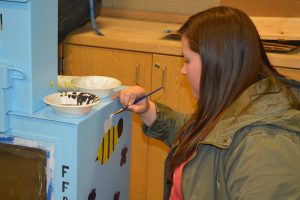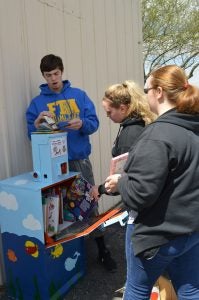Over 800 Miami East elementary and junior high students now have access to a 24-hour, free library within the school district. It’s all thanks to Miami East FFA members who brought the Little Free Library program to the small Ohio community.
“Until this activity the children of the Miami East Local School District did not have a library except for the libraries in the schools,” said Marie Carity, Agriculture Teacher and FFA Advisor at Miami East High School. “This activity gave children access to books beyond the seven-hour school day and nine-month school year. Beforehand, some children in the district were over 15 miles from another library.”
Based in rural Casstown, Miami East FFA is home to 77 students. While only 20 percent of members hail from a production farming background, the chapter discovered a majority had a passion for reading.
“There are several passionate readers in our chapter,” Carity said. “They saw a similar program to this in a neighboring town and thought they could include this opportunity to our young readers.”
A nonprofit organization, Little Free Libary has fostered neighborhood book exchanges around the world. Since the first Little Free Library was built by founder Todd H. Bol in Hudson, Wisconsin in 2009, the number of registered book exchanges has grown to more than 65,000 worldwide. Forty million books are shared annually through the book exchanges, which are individually managed by volunteer stewards in all 50 states and in 80 countries.
After receiving a $400 Living to Serve Grant from the National FFA Organization, 22 junior and senior Miami East FFA members took on the Little Free Library project in January. First, they contacted the local newspaper office to secure seven used newspaper boxes for the program. After securing the boxes, the students were tasked with designing the outside, welding a tray inside, constructing a shelf for the books, applying primer to prevent rusting, and finally painting them. The members used different themes such as underwater, farming, Dr. Seuss, patriotic, or their favorite books series to decorate the boxes.

All of this was in addition to securing donations for the books and collecting at various school and community events.
“There is a wide variety of books in each library,” Carity said. “The target audience is for readers from kindergarten to 8th grade. As books need to be added or exchanged, the chapter can focus on more specific topics, such as agriculture.”
Five townships and two villages now host a Little Free Library box thanks to the chapter. Volunteer members have agreed to check on a box each month, add books as needed, and replace any books that might become soiled. FFA members that live near the boxes have also volunteered to check on them.

On top of the Little Free Library project, the chapter has also started an elementary Reading Buddy program to aide elementary students in 1st and 4th grade with reading and individual educational needs. Weekly, 15 FFA members volunteer their study hall to help read with the students.
And the community feedback has been nothing but positive.
“We’ve been blessed with a great support from our community. Members of the community have donated hundreds of books to help fill them. A family made a monetary donation to help purchase painting supplies and additional books,” Carity said. “We’ve heard from a few young children that were excited to have access to a Little Library in their neighborhood.”
After all, that desire to read and learn starts at a young age. According to Carity, students who read 20 minutes a day are exposed to 1.8 million words a year and are likely to score 90 percent better on standardized tests than their peers that do not read daily.
“Anytime a chapter can give back to their community is reason enough to get involved,” Carity said. “Reading is so important to young minds. Anytime one can put a book in the hand of a child it is a privilege.”



